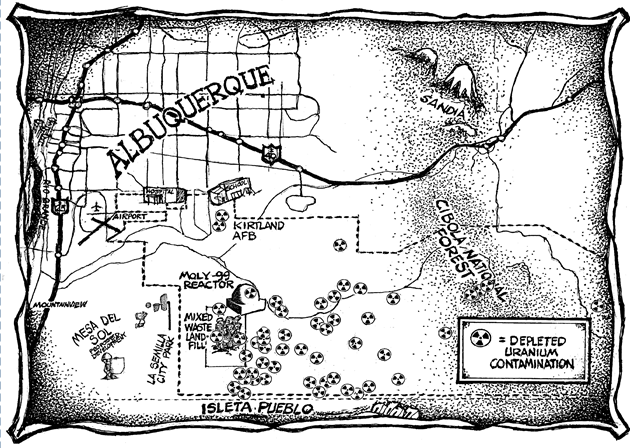
Harambee House, Inc.
Harambee House, Inc. is one of 39 environmental and peace organizations that won a landmark lawsuit against the U.S Department of Energy for failure to follow-through on adequate environmental cleanup during its 50+ years of nuclear weapons research, testing, and production. Part of this settlement was the establishment of the MTA Fund (Citizens’ Monitoring and Technical Assessment Fund), which provided $6.25 million for tribes and non-profit organizations to assess and conduct independent technical and scientific studies regarding the multitude of technical, ecological, and health issues surrounding the nation’s nuclear weapons complex.
Clark University was chosen by the non-profit peace and environmental groups as the conservator of these reports to ensure they remain available to the public in perpetuity. The unconventional election of university as conservator is an innovative example, particularly within the era of Web 1.0, of higher education as protector and provider of information through wide dissemination.
The research and reports available in this series were conducted by Harambee House, Inc. with their allocated portion of the MTA fund.
If you have any questions or concerns please contact us at digitalrepository@clarku.edu.
-

Executive Summary: Analysis of Environmental Justice
Harambee House, Inc. and Mildred McClain Dr.
This is a scientific and technical review of the Department of Energy's Final Environmental Impact Statement on the Proposed Nuclear Weapons Nonproliferation Policy Concerning Foreign Research Reactor Spent Nuclear Fuel (FRR-SNF). The receipt of FRR-SNF adds an additional and important component to DOE's programmatic Spent Nuclear Fuel (SNF) activities. This review also looks at the EIS processes associated with the revised Surplus Plutonium Disposition initiatives. The purpose of this review is to analyze the adequacy of the environmental impact assessment and public participation approaches taken by DOE as part of its decision-making process on spent fuel and surplus plutonium, particularly, at the Savannah River Site (SRS) as required by NEPA (1969). Particular emphasis is placed on the aspect of Environmental Justice to help stakeholders in the local affected communities in understanding the resulting impacts on their communities and DOE policy and practices for implementing the mandates of relevant environmental laws and regulations.
This research was completed money allocated during Round 1 of the Citizens’ Monitoring and Technical Assessment Fund (MTA Fund). Clark University was named conservator of these works.
If you have any questions or concerns please contact us at digitalrepository@clarku.edu
-

Final Report: Analysis of Environmental Justice
Harambee House, Inc. and Michael M. Ashby
This is a scientific and technical review of the Department of Energy's Final Environmental Impact Statement on the Proposed Nuclear Weapons Nonproliferation Policy Concerning Foreign Research Reactor Spent Nuclear Fuel (FRR-SNF). The receipt of FRR-SNF adds an additional and important component to DOE's programmatic Spent Nuclear Fuel (SNF) activities. This review also looks at the EIS processes associated with the revised Surplus Plutonium Disposition initiatives. This analysis evaluates the EIS procedures associated with these two programs for consideration of NEPA requirements with particular emphasis on Environmental Justive. This review has identified deficiencies in DOE's EIS procedures and evaluates some of the problems arising there. This review analyzed the adequacy of the environmental impact assessment and public participation approaches taken by Department of Energy (DOE) as part of decision-making on spent fuel and surplus plutonium.
This research was completed money allocated during Round 1 of the Citizens’ Monitoring and Technical Assessment Fund (MTA Fund). Clark University was named conservator of these works.
If you have any questions or concerns please contact us at digitalrepository@clarku.edu
-

Report Summary: Analysis of Environmental Justice
Harambee House, Inc. and Mildred McClain
This is a scientific review of the impact of the receipt of Foreign Spent Nuclear Fuel (SNF) and Plutonium Disposition programs at the Savannah River Site (SRS) in Aiken Country, South Carolina and its impact on surrounding communities.
This research was completed money allocated during Round 1 of the Citizens’ Monitoring and Technical Assessment Fund (MTA Fund). Clark University was named conservator of these works.
If you have any questions or concerns please contact us at digitalrepository@clarku.edu
-

A Scientific and Technial Review of the Use of Bioremediation as a Clean Up Technique at the Savannah River Site
Harambee House, Inc. and Mildred McClain
This report provides an overview of the fundamentals and field applications of in situ bioremediation in contaminated soil and groundwater. Bioremediation has been presented to the impacted communities as a technology that is currently being used and tested at the Savannah River Site (SRS). The primary focus this report explain bioremediation as a clean-up technology and analyze what role the technology will play in the new accelerated clean up strategy at SRS as approved by Environmental Management at the U.S. Department of Energy (DOE). The objective is to understand how bioremediation is being used at SRS for clean up.
This research was completed money allocated during Round 5 of the Citizens’ Monitoring and Technical Assessment Fund (MTA Fund). Clark University was named conservator of these works.
If you have any questions or concerns please contact us at digitalrepository@clarku.edu


